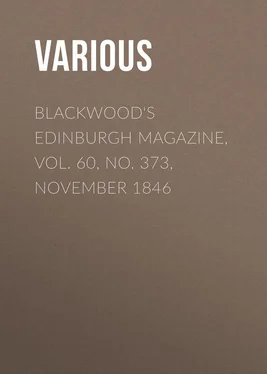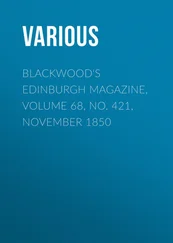Various - Blackwood's Edinburgh Magazine, Vol. 60, No. 373, November 1846
Здесь есть возможность читать онлайн «Various - Blackwood's Edinburgh Magazine, Vol. 60, No. 373, November 1846» — ознакомительный отрывок электронной книги совершенно бесплатно, а после прочтения отрывка купить полную версию. В некоторых случаях можно слушать аудио, скачать через торрент в формате fb2 и присутствует краткое содержание. Издательство: Иностранный паблик, Жанр: periodic, foreign_edu, Путешествия и география, на английском языке. Описание произведения, (предисловие) а так же отзывы посетителей доступны на портале библиотеки ЛибКат.
- Название:Blackwood's Edinburgh Magazine, Vol. 60, No. 373, November 1846
- Автор:
- Издательство:Иностранный паблик
- Жанр:
- Год:неизвестен
- ISBN:нет данных
- Рейтинг книги:5 / 5. Голосов: 1
-
Избранное:Добавить в избранное
- Отзывы:
-
Ваша оценка:
- 100
- 1
- 2
- 3
- 4
- 5
Blackwood's Edinburgh Magazine, Vol. 60, No. 373, November 1846: краткое содержание, описание и аннотация
Предлагаем к чтению аннотацию, описание, краткое содержание или предисловие (зависит от того, что написал сам автор книги «Blackwood's Edinburgh Magazine, Vol. 60, No. 373, November 1846»). Если вы не нашли необходимую информацию о книге — напишите в комментариях, мы постараемся отыскать её.
Blackwood's Edinburgh Magazine, Vol. 60, No. 373, November 1846 — читать онлайн ознакомительный отрывок
Ниже представлен текст книги, разбитый по страницам. Система сохранения места последней прочитанной страницы, позволяет с удобством читать онлайн бесплатно книгу «Blackwood's Edinburgh Magazine, Vol. 60, No. 373, November 1846», без необходимости каждый раз заново искать на чём Вы остановились. Поставьте закладку, и сможете в любой момент перейти на страницу, на которой закончили чтение.
Интервал:
Закладка:
Like many other men who are called on to play an important part in the affairs of the world, William seemed formed by nature for the duties he was destined to perform. Had his mind been stamped by a different die, his character cast in a different mould, he would have failed in his mission. He was not a monarch of the most brilliant, nor a general of the most daring kind. Had he been either the one or the other, he would have been shattered against the colossal strength of Louis XIV., and crushed in the very outset of his career. But he possessed in the highest perfection that great quality without which, in the hour of trial, all others prove of no avail – moral courage, and invincible determination. His enterprises, often designed with ability and executed with daring, were yet all based, like those of Wellington afterwards in Portugal, on a just sense of the necessity of husbanding his resources from the constant inferiority of his forces and means to those of the enemy. He was perseverance itself. Nothing could shake his resolution, nothing divert his purpose. With equal energy he laboured in the cabinet to construct and keep together the vast alliance necessary to restrain the ambition of the French monarch, and toiled in the field to baffle the enterprises of his able generals. With a force generally inferior in number, always less powerful than that of his adversaries in discipline, composition, and resources, he nevertheless contrived to sustain the contest, and gradually wrested from his powerful enemy the more important fortresses, which, in the first tumult of invasion, had submitted to his arms. If the treaties of Nimeguen and Ryswick were less detrimental to the French power than that of Utrecht afterwards proved, they were more glorious to the arms of the Dutch commonwealth and the guidance of William; for they were the result of efforts in which the weight of the conflict generally fell on Holland alone; and its honours were not to be shared with those won by the wisdom of a Marlborough, or the daring of a Eugene.
In private life, William was distinguished by the same qualities which marked his public career. He had not the chivalrous ardour which bespoke the nobles of France, nor the stately magnificence of their haughty sovereign. His manners and habits were such as arose from, and suited, the austere and laborious people among whom his life was passed. Without being insensible to the softer passions, he never permitted them to influence his conduct, or incroach upon his time. He was patient, laborious, and indefatigable. To courtiers accustomed to the polished elegance of Paris, or the profligate gallantry of St James's, his manners appeared cold and unbending. It was easy to see he had not been bred in the saloons of Versailles or the soirées of Charles II. But he was steady and unwavering in his resolutions; his desires were set on great objects; and his external demeanour was correct, and often dignified. He was reproached by the English, not without reason, with being unduly partial, after his accession to the British throne, to his Dutch subjects; and he was influenced through life by a love of money, which, though at first arising from a bitter sense of its necessity in his long and arduous conflicts, degenerated in his older years into an avaricious turn. The national debt of England has been improperly ascribed to his policy. It arose unavoidably from the Revolution, and is the price which every nation pays for a lasting change, how necessary soever, in its ruling dynasty. When the sovereign can no longer depend on the unbought loyalty of his subjects, he has no resource but in their interested attachment. Louis Philippe's government has done the same, under the influence of the same necessity. Yet William was not a perfect character; more than one dark transaction has left a lasting stain on his memory; and the massacre of Glencoe, in particular, if it did not equal the revocation of the Edict of Nantes in the wide-spread misery with which it was attended, rivalled it in the perfidy in which it was conceived, and the cruelty with which it was executed.
On his arrival in Holland on the 18th March 1710, Marlborough again found himself practically involved in the still pending negotiations for peace, over which, on the decline of his influence at court, he had ceased to have any real control. Still exposed to the blasting imputation of seeking to prolong the war for his own private purposes, he was in reality doing his utmost to terminate hostilities. As the negotiation with the ostensible plenipotentiaries of the different courts was at an end, but Louis still continued to make private overtures to the Dutch, in the hope of detaching them from the confederacy, Marlborough took advantage of this circumstance to endeavour to effect an accommodation. At his request, the Dutch agent, Petcum, had again repaired to Paris in the end of 1709, to resume the negotiation; and the Marlborough Papers contain numerous letters from him to the Duke, detailing the progress of the overtures. 2 2 Marlborough to the Earl of Sunderland, 8th Nov. 1709. Disp. iv. 647. Coxe, iv. 167.
On the very day after Marlborough's arrival at the Hague, the plenipotentiaries made their report of the issue of the negotiation; but the views of the parties were still so much at variance, that it was evident no hopes of peace could be entertained. Louis was not yet sufficiently humbled to submit to the arrogant demands of the Allies, which went to strip him of nearly all his conquests; and the different powers of the confederacy were each set upon turning the general success of the alliance to their own private advantage.
Zenzindorf, on the part of Austria, insisted that not the smallest portion of the Spanish territories in Italy should be ceded to a prince of the house of Bourbon, and declared the resolution of his imperial master to perish with arms in his hands, rather than submit to a partition which would lead to his inevitable ruin. King Charles expressed the same determination, and insisted further for the cession of Roussillon, which had been wrested from Spain since the treaty of the Pyrenees. The Duke of Savoy, who aimed at the acquisition of Sicily from the spoils of the fallen monarch, was equally obstinate for the prosecution of the war. Godolphin, Somers, and the Dutch Pensionary, inclined to peace, and were willing to purchase it by the cession of Sicily to Louis; and Marlborough gave this his entire support, provided the evacuation of Spain, the great object of the war, could be secured. 3 3 Coxe, iv. 169. Lamberti, vi. 37, 49.
But all their efforts were in vain. The ambitious designs of Austria and Savoy prevailed over their pacific counsels; and we have the valuable authority of Torcy, who, in the former congress, had accused the Duke of breaking off the negotiation, that in this year the rupture was entirely owing to the efforts of Count Zenzindorf. 4 4 Note to Petcum, August 10, 1710. Marlborough Papers ; and Coxe, iv. 173.
Marlborough, however, never ceased to long for a termination of hostilities, and took the field with a heavy heart, relieved only by the hope that one more successful campaign would give him what he so ardently desired, the rest consequent upon a general peace. 5 5 "I am very sorry to tell you that the behaviour of the French looks as if they had no other desire than that of carrying on the war. I hope God will bless this campaign, for I see nothing else that can give us peace either at home or abroad . I am so discouraged by every thing I see, that I have never, during this war, gone into the field with so heavy a heart as at this time. I own to you, that the present humour in England gives me a good deal of trouble; for I cannot see how it is possible they should mend till every thing is yet worse." Marlborough to Duchess Marlborough , Hague, 14th April 1710. Coxe, iv. 179.
Интервал:
Закладка:
Похожие книги на «Blackwood's Edinburgh Magazine, Vol. 60, No. 373, November 1846»
Представляем Вашему вниманию похожие книги на «Blackwood's Edinburgh Magazine, Vol. 60, No. 373, November 1846» списком для выбора. Мы отобрали схожую по названию и смыслу литературу в надежде предоставить читателям больше вариантов отыскать новые, интересные, ещё непрочитанные произведения.
Обсуждение, отзывы о книге «Blackwood's Edinburgh Magazine, Vol. 60, No. 373, November 1846» и просто собственные мнения читателей. Оставьте ваши комментарии, напишите, что Вы думаете о произведении, его смысле или главных героях. Укажите что конкретно понравилось, а что нет, и почему Вы так считаете.












